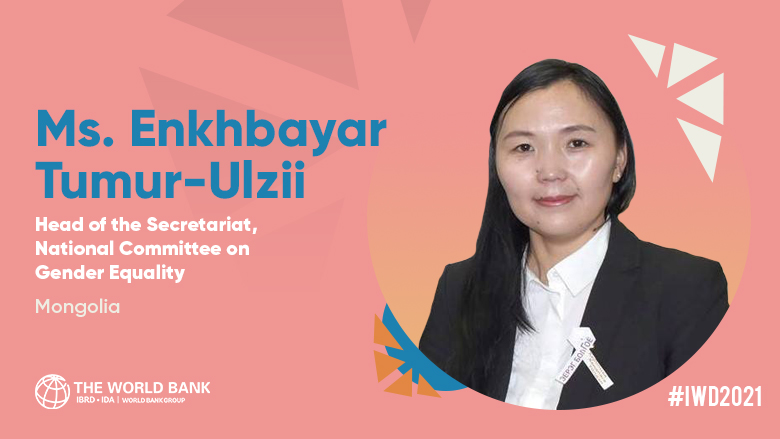How was your work impacted by the pandemic?
The Gender Secretariat has the responsibility to provide professional guidance and support in ensuring national coordination for implementation of the law. Therefore, the vast majority of our activities are hands-on, face-to-face, classroom type, with numerous meetings, seminars, trainings and rural trips. However, during the pandemic, our modus operandi has transformed. Our team has learnt a lot of new skills having to work mostly online. We are trying not to compromise to work productively while being away from the office.
Do you think the pandemic has presented new challenges for women in Mongolia? What challenges?
COVID-19 has presented many new challenges for women. With quarantines and movement restrictions in place, women are evenmore engaged in so-called unpaid labor. Plus, they must attend to childrens’ televised and online classes, provide additional care for family members, elderly and young, not to mention working online themselves – overall, women’s burdens increased significantly. In addition, some women experience disruptions in their incomes, which presents severe financial challenges to women and making them financially dependent on others.
Do you think the pandemic has created any positive changes for gender equality in Mongolia?
There are indeed some positive changes. Women were given opportunity to work from home while looking after their children. Moreover, some organizations have introduced flexible work hours, thus the risk of children being left alone at home without guardians’ supervisions is reduced – it’s a series issue concerning children’s safety. Also, during COVID-19, families spend more time together, share more with their family and loved ones and also are given the opportunity to understand family members’ work and other duties more.
What do you think needs to be done to ensure more women take up in leadership positions in Mongolia?
Statistics show that women in Mongolia are more educated than their male peers. However, their representation in leadership positions is far from enough. Since appointments to any highranking government position is strongly influenced by the ruling party in our country, I tend to think that Mongolian women need to support and cooperate with each other even more. On the other hand, women need to be more proactive in letting others know of themselves and their work, such as by being more involved in women caucuses of political parties they support, or getting involved in any other public activities within their professional circles. In general, we need to do more in terms of demonstrating our work and our potentials.
What do you enjoy most about your work?
I am truly honored that through my work, I contribute to endeavors to uphold and protect human dignity. Also, our team has one spirit and vision which gives me strength to move forward in face of any challenges.
Do you have any advice for women in Mongolia?
There are no tasks, frontiers or achievements beyond the reach of Mongolian women. I would like to wish all the best in their lives.
What are your hopes and plans for the future?
My wish is to continue my service to my people, wholeheartedly and truly, as civil servant sworn in to help make lives of every Mongolian happy and full of joy. I really do hope that all Mongolians accomplish what they aspire to accomplish, by persevering andbelieving in their own ability, dreams and aspirations.
**The views expressed in this interview do not necessarily represent the views of the World Bank Group and its employees.



